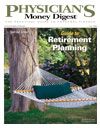Publication
Article
Physician's Money Digest
Are Baby Boomers Ready for Retirement?
Author(s):
Baby boomers made their entranceinto the world around the 1950s.In the 1960s they earned an education.Throughout the 1970s, they gotmarried, and during the 1980s they hadchildren. By the 1990s they were stillworking hard in their careers. In thepresent, they will all begin to retire. Butalong the way, did they save enoughmoney to retire? Many baby boomersare wise to the fact that they did not.Surely, if you're a physician of this agebracket, you were privy to necessarypreparations for the expected future,right? More likely, you've been putting alittle away each year since you couldafford to, building up a modest 401(k).
Time is running out for boomers. Ifyou stopped working tomorrow, wouldyou be financially secure to maintainyour lifestyle for the rest of your life?Retirement planning used to mean youhad to reserve enough money for only10 years. But thanks to technology, lifeexpectancy has risen. Retirement fundsmust last 2 to 3 times as long as theyonce did. Boomers are realizing theymay not be able to stop working asearly as planned. Your options are topostpone retirement, reduce expensesduring retirement, or begin a secondcareer after retirement.
When people reach an age that grantsthem senior citizen discounts, they oftendecide it's time to retire. But turning age55, 60, or 65 doesn't translate into automaticcareer surrender. Assuming youare healthy and active, it only makessense to continue a fulfilling lifestyle. Ifbeing a doctor makes you happy, don'tturn in your white coat just yet. Even ifyou're not there yet, it's important totake action now and prepare for thefuture. It's critical that you plan for yourfinancial independence. Work with afinancial professional to determine howmuch longer you may need to work,how much money you should save, andhow to diversify your investments sothat you have a better chance of retiringwhen you are ready while maintainingyour lifestyle.
You should also deal with long-termcare before you actually need it. Considerapplying for long-term care insurancewhile you are young and healthy—you are more likely to get insured, andthe initial premium will be lower basedon your current age and well-being. Inaddition, address sandwich-generationissues. Ensure that you have a plan toafford college for your children andproper care for your parents. Retirementshould be a time for recreationand relaxation; but to enjoy it,you need to be ready—both mentallyand financially.
Katherine B. Paal, MBA, CFP®, CTFA, is a
Certified Financial Planner™practitioner at
Heritage Financial Consultants in Lutherville,
Md, and is an investment advisor representative,
registered representative, and
licensed insurance broker with Lincoln Financial Advisors,
a registered investment advisor and broker-dealer (1300
York Road, Lutherville, Md; 410-339-6675). She welcomes
questions or comments at kpaal@LNC.com.
